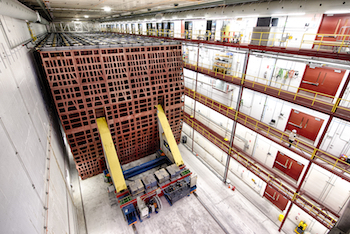The NOvA Detectors
NOvA Detector Technology
The NOvA detectors are crucial to NOvA's science goals. Being able to positively identify signal electron appearance in the Far detector data is vital to measuring oscillation parameters and the all important neutrino mass hierarchy. NOvA's detectors achieve excellent signal to background ratios by using two facts:
- The NOvA detectors are 14.6mrad off-axis from the NuMI beam, meaning that they see a very narrow beam spectrum right at the oscillation maximum, and consequently the main Neutral Current background from higher neutrino energies is very significantly reduced
- The NOvA detectors use low-Z liquid scintillator as the detection medium which means that the activity seen in the detectors is sampled once every 0.15 radiation lengths rather than once every 1.4 radiation lengths for MINOS for example.
The Near and Far Detectors

The NOvA detectors are highly active with 65% active volume, collecting as much light as possible using long wavelength shifting fibers that are read out by Avalanche Photo-Diodes (APDs). The detectors are made out of long PVC cell strips, 3.9cm x 6cm in cross-section, filled with the liquid scintillators and arranged one next to the other to construct readout planes. In order to allow 3-D reconstruction of physics interactions, each consecutive plane is placed orthogonally with respect to the previous one. The NOvA Near detector is smaller than the Far detector as it is close to the NuMI beam, at 4m x 4m x 15m long, while the NOvA Far detector is trully enormous at 14 kilotonnes. It is approximately 15m tall and wide, and 60m long. It consists of 896 individual planes containing 344,064 individual channels!
